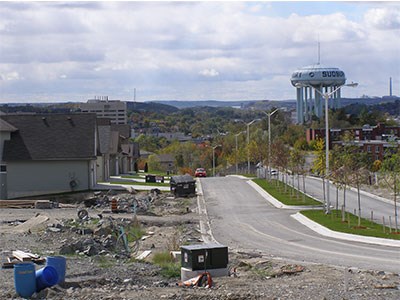Contractors and homebuilders say NIMBYism is getting to be a problem in Sudbury.
Three organizations—the Sudbury Chamber of Commerce, Sudbury & District Home Builders' Association and the Sudbury Construction Association—say the Not In My Backyard syndrome is causing a problem with project delays and increasing costs for developers.
In a July release, the groups voiced the frustration of developers who say the city is “planning by politics” when development proposals face opposition from local residents.
Despite city committee and departmental approvals, they feel applications for commercial, industrial and residential developments are unnecessarily heading to the Ontario Municipal Board (OMB).
Denis Shank, executive director of the Sudbury Construction Association, said the city should be following its Official Plan to guide development rather than abiding by a vocal minority.
“Cities do these (Official) plans in order to increase the population base and tax base but we can’t grow the city if we keep turning down (development).”
The groups said the frequency of NIMBY objections is jeopardizing the municipality's ability to meet the needs of development and keep taxes down.
“Every year the city tries to have a zero tax increase. Well, they can’t keep doing that forever.”
In most municipalities it's common for residents to pack council chambers and pressure politicians to turn down development applications despite approvals from city building officials. But in recent months in Sudbury, Shank said it's gotten worse.
“We've never really had a problem like this before. All of a sudden there are waves coming in.”
Shank said developers have no objections to public input in the process but say frequently there's a
vocal minority that greatly influences the process.
And often there seems to be no compromise in the decision-making process.
“It’s almost like the developer knows he's going to have to think two steps ahead but he knows some people are going to complain.”
The group said the Official Plan provides that a broad range of housing choices must be made available to the market. But the public pressure being applied in the political arena is condemning development proposals in spite of costly planning studies by developers.
“They might have just put in $300,000 to $400,000 of their own money (in studies) to help the city develop, and then they're turned down,” said Shank.
In its release, the group said in its research of the nine OMB appeals in 2012, it cost taxpayers $138,000 to retain outside legal advice, not including city staff time spent at OMB hearings.
One subdivision homebuilder spent more than $100,000 to prepare for an OMB hearing only to settle with what was officially proposed.
A big issue is the “lack of enthusiasm” to pursue in-fill properties involving mixed-use development. Shank said it can be a complex, confusing and expensive proposition to find new uses for vacant land, abandoned buildings and brownfields, “but with the system we have with development charges it should more than help.”
Shank feels there have been missed opportunities to build new housing and it's ultimately hurting the city's reputation for attracting outside investment.
“Knowing this might happen to them, (developers) are a lot more leery in spending on engineering, (environmental) assessments and traffic surveys if they're faced by a bunch of people waving flags and wearing the same colour shirts at (Tom Davies) Square.”
Shank said developers welcome community feedback but feels the reasons why applications are turned down at the council stage are simply not valid and not credible.
“Fifty people saying they don’t want it there should not carry weight.”
Shank said if a developer knows he might have to go through the OMB process, he might not develop at all.
“And if you lose, that cost gets transferred onto the next job.”
Ultimately, said Shank, those expenses are passed on to the consumer.
“Those lots are no longer worth $80,000, they’re worth $110,000. Or they pass over buying a piece of land knowing they might never recover the money. Are there missed opportunities? Of course there are.”
Shank said there's not been much feedback from the community or the City of Greater Sudbury since the news release.
“We’re hoping that this letter would say that, we’re watching.
“Politicians have a difficult job and maybe they don't understand the complexities of the system.”




